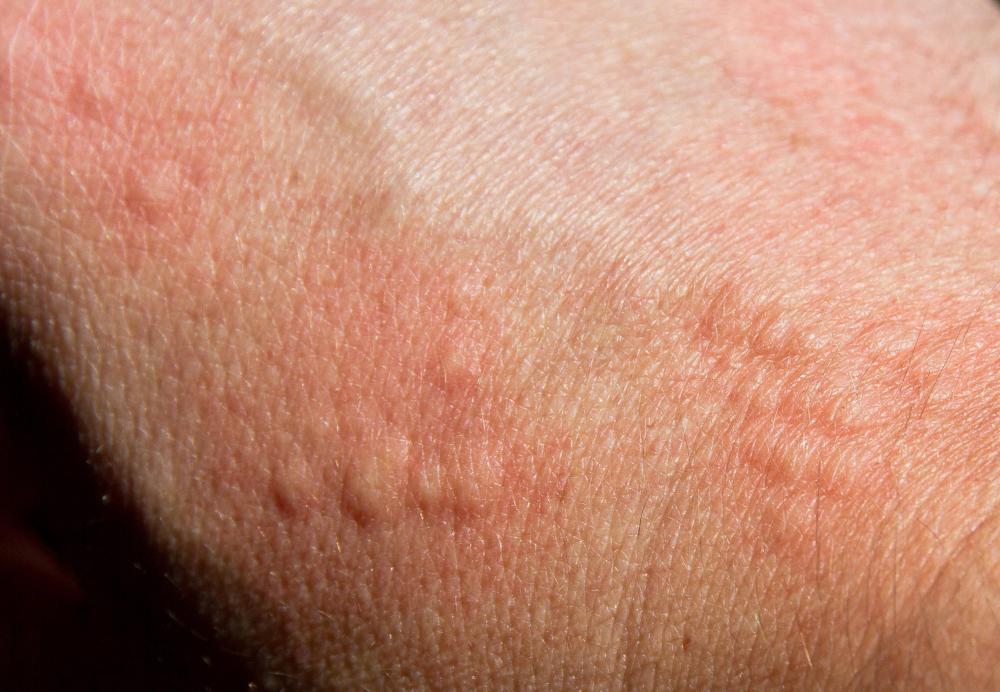At WiseGEEK, we're committed to delivering accurate, trustworthy information. Our expert-authored content is rigorously fact-checked and sourced from credible authorities. Discover how we uphold the highest standards in providing you with reliable knowledge.
What are the Different Diseases Associated with Mast Cells?
There are several diseases and conditions associated with mast cells, including allergies and arthritis. Mast cells are found in everyone’s body and they typically act to ward off invaders as part of the immune system. Those with disease involving these cells may develop an autoimmune disorder, which is when cells attack the body itself. Allergies are also caused by mast cell disorders, because they illicit a strong immune response against things which are not posing a threat.
Rheumatoid arthritis is one of the most common diseases associated with mast cells. It causes swelling, stiffness, and sometimes debilitating pain in the joints. This occurs because the body begins attacking the cartilage lining the joints. Other autoimmune disorders can also occur because of an overproduction of mast cells, which can cause inflammation in nearly any system of the body.

Allergic reactions are another type of illness associated with mast cells. These occur when the immune system recognizes a foreign threat, even when there is none. At other times the threat is real, but the immune system responds much stronger than necessary. This is what leads to the itchy eyes, sneezing, watery eyes, cough, and congestion associated with allergies. Other symptoms are hives, skin rash, itchiness, trouble breathing, dizziness, and swelling.

Triggers for allergies vary, and each person may be allergic to something different. Mold, mildew, pollen, dust mites, shellfish, and nuts are all common allergens. Even those who have not previously experienced allergy symptoms can begin having them, and those who have had them all their lives can develop new ones. Treatments are available to lessen symptoms or to abate the immune response altogether.

Other diseases caused by mast cells can cause inflammation in the body’s organs and other systems. One example of this is lupus, an autoimmune disease which causes chronic inflammation. Many of these disorders are not fully understood and their diagnosis is normally made by a process of excluding other conditions.
Irritable bowel syndrome is another poorly understood condition which may be associated with mast cells. It is characterized by long-term digestive upset. Symptoms may include gas, bloating, diarrhea, constipation, an alternation between diarrhea and constipation, heartburn, and severe abdominal pain. Researchers are not entirely sure what causes this condition, although it may be that the immune system is attacking the digestive tract. Diet and sometimes medications often alleviate symptoms.
AS FEATURED ON:
AS FEATURED ON:














Discussion Comments
I had a dog that had a mast cell tumor. I know the dog was at least 15 years old and probably older. He was a stray who showed up at the house one day after a storm. He was young then, but he was tall-- and skinny. He stayed with me until he got old.
I found a knot on his side one day, and I didn't think too much of it at first, but when it didn't go away, I decided to take him to the vet and see what was going on. You spend that many years with an animal and you get attached to it.
The vet told me the knot was a mast cell tumor and the dog had skin cancer. I was given the option of having the tumor removed with surgery, but by that time the dog was so old that I thought surgery would be too hard on him. He lived for another six months or so, and I finally had him put to sleep when he got really bad and could hardly get about.
The vet told me that canine mast cell cancer is the most common type of cancer in dogs. This was the first dog I knew to have cancer, but when I was a kid, my parents never took the dogs to vets except to get the required shots.
I never had any type of allergy when I was a kid growing up, with the exception of being allergic to milk when I was a baby. I had to drink milk made from soybeans. Anyway, when I reached my early 20s I developed an allergic reaction to dust.
I was in my dorm room one day, and I started sneezing and could not stop. Then I started sweating and eventually hives broke out on my arms. When I went to the medical center they gave me some tablets and sent me to a doctor who did a series of allergy test to see what I was allergic to.
That was the first time I heard anything about mast cells. I can remember thinking cancer when the doctor said mast cells, but of course I was way off base. Anyway, I take an over-the-counter allergy pill and I don't have any breakouts or sneezing attacks.
Post your comments